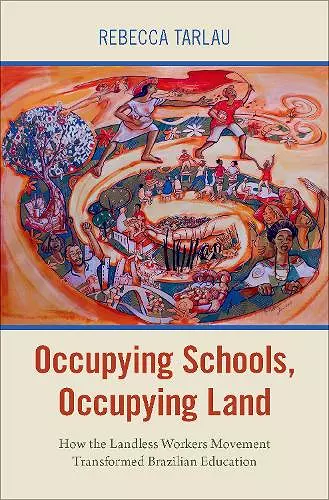Occupying Schools, Occupying Land
How the Landless Workers' Movement Transformed Brazilian Education
Format:Hardback
Publisher:Oxford University Press Inc
Published:20th Jun '19
Currently unavailable, and unfortunately no date known when it will be back
This hardback is available in another edition too:
- Paperback£27.49(9780197584347)

Over the past thirty-five years the Brazilian Landless Workers Movement (MST), one of the largest social movements in Latin America, has become famous globally for its success in occupying land, winning land rights, and developing alternative economic enterprises for over a million landless workers. The movement has also linked education reform to its vision for agrarian reform by developing pedagogical practices for schools that foster activism, direct democracy, and collective forms of work. In Occupying Schools, Occupying Land, Rebecca Tarlau explores how MST activists have pressured municipalities, states, and the federal government to implement their educational program in public schools and universities, affecting hundreds of thousands of students. Contrary to the belief that movements cannot engage the state without demobilizing, Tarlau shows how educational institutions can help movements recruit new activists, diversify their membership, increase technical knowledge, and garner political power. Drawing on twenty months of ethnographic field work, Tarlau documents how the MST operates in different regions working at times with or through the state, at other times outside it and despite it. She argues that activists are most effective using contentious co-governance, combining disruption and public protest with institutional pressure to defend and further their goals. Through an examination of the potentials, constraints, failures, and contradictions of the MST's educational struggle, Occupying Schools, Occupying Land offers insights into the relationship between education and social change, social movements and states, and the barriers and possibilities for similar reforms in democratic contexts throughout the world.
This is a brilliant book by a brilliant young scholar. It is one of the finest studies available on the Brazilian Landless Movement (the MST), perfectly balancing rigorous comparative institutional analysis with an activist's appreciation for social justice and an ethnographer's attention to detail. Tarlau captures nicely the complexity of the political landscape in Brazil, and she makes a compelling argument for the underappreciated role that education can play in institutionalizing social mobilization * Wendy Wolford, Cornell University *
It's hard to know where to begin in praise ofOccupying Schools, Occupying Land.For starters, this is political ethnography at its very best.Tarlau has also given us the richest study of Movimento dos Trabalhadores Rurais Sem Terra produced to date.But to me, the great value of the book is the powerful corrective it offers to that strand of social movement theory that views engagement with political institutions as inherently conservative. Never has the 'long march through institutions'-and its benefits-been studied as systematically and persuasively. * Doug McAdam, Stanford University *
This book is essential reading for anyone who is concerned with the struggles for a more critically democratic set of social and educational policies. It paints a nuanced and powerful picture of the role of a crucial social movement in necessary transformations. * Michael W. Apple, University of Wisconsin-Madison, and author of The Struggle for Democracy in Education *
This book powerfully illustrates the possibilities (and perils) when social movements like Brazil's MST engage the state. Through rich ethnography and capacious theorizing, the book translates a central insight of Latin American critical traditions for a North American audience: that it is possible to engage institutions in ways that strengthen movements and transform political horizons. This is a timely and deeply relevant book for not only Brazil and Latin America, but also for all contemporary debates on socialism, democracy, and the future of the left * Gianpaolo Baiocchi, New York University, and author of We, The Sovereign *
Occupying Schools, Occupying Land is an extraordinary piece of scholarship, both in its fine-grained empirical narrative and its theoretical argument. The originality of its insights and arguments go far beyond research on the Landless Peasant Movement and schools in Brazil. It is an important contribution to the Gramscian current of social theory and should be read by anyone interested in the potentials and dilemmas of struggles for progressive social transformation in capitalist societies. * Erik Olin Wright, University of Wisconsin-Madison *
Tarlau's impressively organized text is framed as a rebuttal to Michels (1915) and Piven and Cloward (1977), who suggest that movements inevitably deradicalize and demobilize as they engage more with the state. * Gregory Duff Morton, Journal of the Royal Anthropological Institute *
- Winner of Winner of the 2020 American Political Science Association Michael Harrington Book Award Winner of the 2020 American Sociology Association Sociology of Development Book Award Winner of the 2020 Comparative and International Education Society Globalization and Education SIG Book Award Winner of the 2020 LASA Brazil Section Best Book Prize in the Social Sciences Winner of 2019 BRASA Robert Reis Best Book Award.
ISBN: 9780190870324
Dimensions: 157mm x 236mm x 38mm
Weight: 703g
416 pages